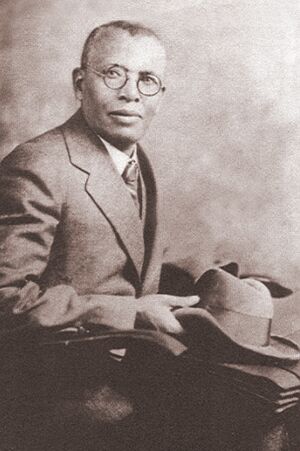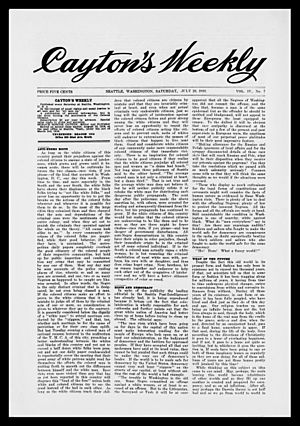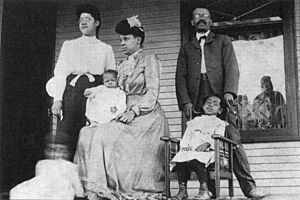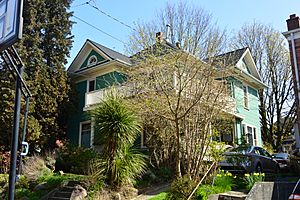Horace R. Cayton Sr. facts for kids
Horace Roscoe Cayton Sr. (born 1859, died 1940) was an American journalist and a person who worked for social change. He was the son of a slave and a white plantation owner's daughter. In the early 1890s, Cayton moved to Seattle, Washington. There, he started his own newspaper, the Seattle Republican, in 1894. This newspaper was the longest-running of seven African-American newspapers in Seattle between 1891 and 1901. It stopped publishing in 1913.
Horace Cayton started a second newspaper in 1916 called Cayton's Weekly. This four-page newspaper focused on national and local news important to Black readers. In 1921, it faced money problems and briefly became Cayton's Monthly before it closed completely.
Contents
Horace Cayton's Life Story
Growing Up and Education
Horace Cayton was born in 1859 on a large farm in Mississippi. After the Emancipation Proclamation freed enslaved people, his family moved to a farm near Port Gibson, Mississippi. He went to Alcorn College, which is now called Alcorn State University. He was a student there in 1872.
Starting a Newspaper Career
Horace Cayton moved west, believing his education would help him reach his goals. He arrived in Seattle and worked as a political reporter for the Seattle Post-Intelligencer. Later, he worked at the Seattle Standard, which was Seattle's first newspaper for African Americans. He worked there until it closed in 1893.
The next year, Cayton started his own newspaper, the Seattle Republican. The first issue came out in May 1894. This newspaper aimed to attract both white and Black readers. It had some success, though its readership was small, never more than about 2,000 people.
In 1896, Cayton married Susie Revels. He had met her in college. Susie Revels was the daughter of Senator Hiram Rhodes Revels. He was a Reconstruction-era Republican from Mississippi. Senator Revels was the first African American elected to the United States Senate. After they married, Susie Revels Cayton became an editor for the Seattle Republican.
Cayton's Republican newspaper spoke out against problems in the city government. He reported on issues during the Klondike Gold Rush era. He faced legal challenges because of his reporting, but he was found not guilty.
The Republican Party was popular with many Black people, and Horace gained an important role in the party. He often attended county and state meetings. He was the secretary of the party's King County meeting in 1902. For many years, he was also a member of the Republican State Central Committee. Between 1900 and 1910, the number of Black people in Seattle grew by almost 2,000. This led to more prejudice from some white people. Horace lost political influence, and after 1910, he no longer held positions on the Republican State Central Committee or attended party meetings.
Horace Cayton was affected by the changing racial and political situation in Seattle. On May 2, 1913, the Seattle Republican stopped publishing. This happened after Horace lost a court case where he had sued a restaurant for not allowing him to return after they had served him. He continued his publishing career. He started Cayton’s Weekly in 1916, which later became "Cayton's Monthly." He retired in 1921.
Later Years and Family
Horace sold his home on Capitol Hill and moved into an apartment building he owned, which provided him income. During the Great Depression, they lost two houses and the apartment building. However, they continued to live in one of the houses, paying $10 a month in rent. Horace and his wife became very involved in the growing Black community. They took part in many social and community events. He stayed connected to the Republican Party through the King County Colored Republican Club.
Death and Lasting Impact
Horace Cayton died in 1940, and Susie followed in 1943.
Horace's son, Horace R. Cayton Jr. (1903–1970), became a teacher, researcher, government official, newspaper writer, and a famous sociologist. He is known for his book Black Metropolis, which he wrote with St. Clair Drake. This book helped explain African American behavior, personality, and culture that came from living in a white-dominated world. Like his father, Horace Jr. cared deeply about racial equality and civil rights. He wrote about these topics often in his newspaper column for the Pittsburgh Courier.
Another son, Revels Cayton, became a leader in labor unions and a deputy mayor of San Francisco. His daughter Madge Cayton earned a business degree from the University of Washington, just like her brother Horace. Another daughter, Lillie Cayton, was a social activist in Seattle and later in San Diego, California.
Images for kids
 | James B. Knighten |
 | Azellia White |
 | Willa Brown |









